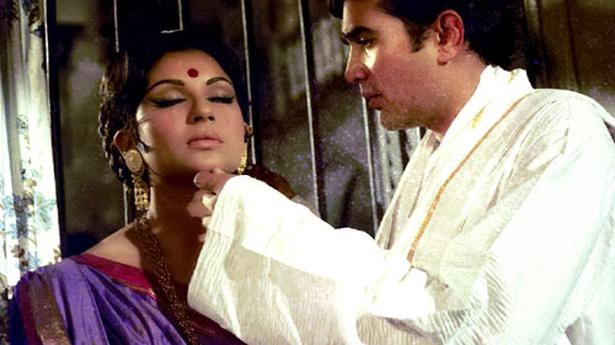
Iconic Hindi film Amar Prem turns 50
The Hindu
Amar Prem’s Anand hated tears but he ensured that the audience went home weeping buckets
‘Who can make flowers bloom in a garden that’s destroyed by spring?’ This reflective line written by Anand Bakshi for a song in Shakti Samanta’s Amar Prem (1972) truly makes the song and the film immortal. It has been 50 years since Anand Bakshi and R.D. Burman stoked a spark that continues to light a million hearts. Young women still wait for the elusive Shyam as a dreamy night uncoils. We still quote ‘Kuchh toh log kahenge’ every time we do something unconventional, and we hum ‘Ye kya hua’ when life springs its surprises on us.
Based on a Bibhutibhushan Bandopadhyay story ‘Heeng Kochuri’ and adapted from Arabinda Mukherjee’s Bengali film Nishi Padma (1970), the innocence that marks the Bangla version remains intact in the Hindi film, as Shakti Samanta asked Arabinda to write the screenplay for it.
We see a forbidden space from the eyes of a child. For me, the abiding image of the film is when Nandu, in search of his football, crouches on his knees and peeks from beneath a curtain into a room where a courtesan is honing her dance moves for the evening. Later, he asks Pushpa, the golded-hearted courtesan, what kind of people come to meet her: “Are they your brothers?”
The bond between Pushpa and Nandu finds expression in ‘Bada natkhat hai re Krishna kanhaiyya’, composed in raag Khamaj, a song that made a mark only after Pancham’s father S.D. Burman asked him to redo the tune to reflect the prostitute’s sorrow that she cannot be a mother. And Lata too sang it with intense emotionality.
This chaste approach to the prostitute’s character permeates the love story as well, the pyara rishta (beautiful relationship), as Anand describes the platonic bond between him and Pushpa. It reflects in Sharmila Tagore’s eyes, which unleash a seductive storm in ‘Chingari Koi Bhadke,’ and in Rajesh Khanna’s gaze that is always playful, sometimes rakish.
In ‘Chingari’, the lighting and the silhouette of Howrah Bridge in the background cast an enchanting spell; few people know that the song was shot inside Mumbai’s Natraj Studios like the rest of the film.
Anand is slotted into a side act, but Khanna knows how to leave a lasting impression. A man who is emotionally scarred but hates tears, he expresses the duality with charming precision in a role that was played by Uttam Kumar in the Bangla version.











